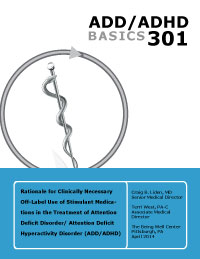ADD Basics offers several series of publications about ADD/ADHD and related topics intended to educate, guide, and cheerlead individuals dealing with the disorder. We strive to keep resources free or at minimal cost for the benefit of spreading the awareness and acceptance of ADD/ADHD.
Browse our resources below or join our movement.
Basics 100 Level
The Basics 100 Level resources address general knowledge topics on ADD/ADHD and related concerns. Publications in this category are an excellent starting point for anyone new to the disorder or people looking for a general overview of living with ADD.
Basics 200 Level
The Basics 200 Level resources provide a more in-depth understanding of ADD/ADHD. Publications in this level provide tools and detailed strategies for dealing with relationships, life management, organizational strategies, communication skills, health, family, parenting, school, college, career, and aging issues.
Basics 300 Level
The Basics 300 Level resources provide high-quality, authoritative, scientific knowledge of ADD/ADHD. Savvy readers can expect to find journal quality or white paper articles addressing the finer points of ADD/ADHD, co-morbidities, or health issues.
Basics 400 Level
The Basics 400 Level resources solicits a wide variety of expert insight and advice on living successfully with ADD/ADHD. Within this level, TRANShealth Inc. seeks to publish a wide range of credentialed authors, inviting a wide range of voices to join the ongoing discussion of living successfully with ADD/ADHD today. We welcome qualified submissions from parents, counselors, coaches, educators, physicians, academicians, and others who live or work with ADD/ADHD.
Basics 100 Level
 Basics 101: How to Be A Good Consumer of Diagnostic and Treatment Services for ADD/ADHD
Basics 101: How to Be A Good Consumer of Diagnostic and Treatment Services for ADD/ADHD
Think ADD/ADHD might be a problem for you or someone you know? Take a step now! Basics 101 answers questions like “What is ADD/ADHD?” “How do I find the right care provider?” “What steps should be undertaken for an accurate diagnosis?” and “What constitutes the correct treatment of ADD/ADHD?”. With the raft of misdirection and misinformation circulating about ADD/ADHD, we’re excited to capture Dr. Liden’s 30 years of expertise in this Guide that will help so many families and individuals ensure effective, lifelong treatment for ADD/ADHD. For further ADD/ADHD resources and treatment options, visit Dr. Liden’s clinic, The Being Well Center.
Join our mailing list and receive a free download of our PDF, Kindle or ePUB ebook today. Or, Paperback (52 pages) available to purchase for $4.93 + S&H (a $10.95 value).
Basics 200 Level
Basics 300 Level
 Basics 301: Rationale for Clinically Necessary Off-Label Use of Stimulant Medications in the Treatment of Attention Deficit Disorder / Attention Deficit Hyperactivity Disorder (ADD/ADHD)
Basics 301: Rationale for Clinically Necessary Off-Label Use of Stimulant Medications in the Treatment of Attention Deficit Disorder / Attention Deficit Hyperactivity Disorder (ADD/ADHD)
State of the art care for Attention Deficit Disorder/Attention Deficit Hyperactivity Disorder (ADD/ADHD) frequently requires doses/dosage regimens of stimulant medications that are at variance with FDA approved manufacturer’s guidelines (i.e., off-label). Lack of training and experience about ADD/ADHD and its pervasive nature, limited experience with the medications used to treat it, and a misunderstanding/misinterpretation of the intent of the FDA approved guidelines promotes fear of off-label use of stimulant medications in patients and many professionals. As a result, many patients who could greatly benefit from proper treatment receive sub-therapeutic dosage regimens or no treatment at all.
The medical literature provides ample support for the safe use of off-label doses/dosage regimens of stimulants in children and adults with ADD/ADHD when tailored to a patient’s individual needs. A national survey of family physicians, pediatricians, developmental pediatricians, and child/adult psychiatrists has shown that greater than 45% have prescribed stimulant mediations for ADD/ADHD off-label.
By using a systematic protocol that involves a comprehensive multidisciplinary assessment to first establish a valid ADD/ADHD diagnosis and identify related co-morbidities, objective in office medication trial testing, and ongoing supportive counseling, we have safely incorporated off-label dosing regimens of stimulant mediations when needed to help our ADD/ADHD patients function effectively in all life spheres . . . Read the complete article:
- Download the article to read in e-Readers: basics301_ebook
- Download the article to print: basics301_print
Basics 400 Level